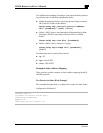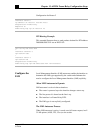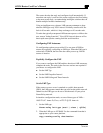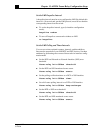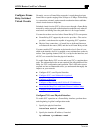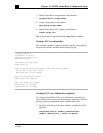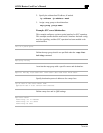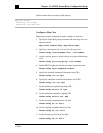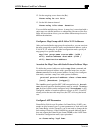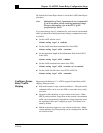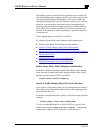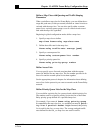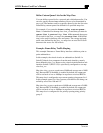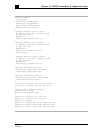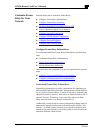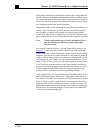
AI2524 Router Card User’s Manual
Page 13-12 August 1997
2524UM
12. Set the outgoing excess burst size (Be).
frame-relay be out
bits
13. Set the idle timeout interval.
frame-relay idle-timer
duration
You can define multiple map classes. A map class is associated with a
static map, not with the interface or subinterface. Because of the flex-
ibility this association allows, you can define different map classes fo
different destinations.
Configure a Map Group with E.164 or X.121 Addresses
After you have defined a map group for an interface, you can associate
the map group with a specific source and destination address, such as
E.164 or X.121 addresses. In global configuration mode, specify th
map group for a specific interface:
map-list
group-name
source-addr {e164 |
x121}
source-address
dest-addr {e164 |
x121}
destination-address
Associate the Map Class with Static Protocol Address Maps
To define the protocol addresses under a
map-list
command and
associate each protocol address with a specified map class, use the
class
command for each protocol address. In map class configura-
tion mode, associate a map class with a protocol address:
protocol protocol-address
class
class-name
[ietf] [broadcast [trigger]]
The
ietf
keyword specifies RFC 1490 encapsulation; th
broad-
cast
keyword specifies that broadcasts must be carried. The
trig-
ger
keyword, which can be configured only if
broadcast
is also
configured, enables a broadcast packet to trigger an SVC. If an SVC
already exists that uses this map class, the SVC will carry the broad
cast.
Configure LAPF Parameters
Frame Relay Link Access Procedure for Frame Relay (LAPF) com-
mands are used to tune Layer 2 system parameters to work well with
the Frame Relay switch. Normally, you do not need to change the de-
fault settings. However, if the Frame Relay network indicates that it
does not support the Frame Reject frame (FRMR) at the LAPF Fram
In interface configuration mode, reject procedure:
no frame-relay lapf frmr



